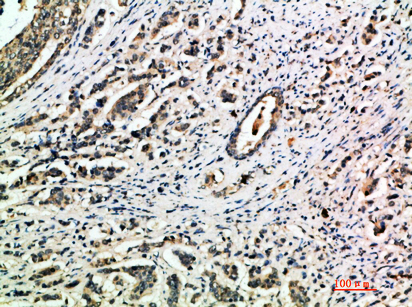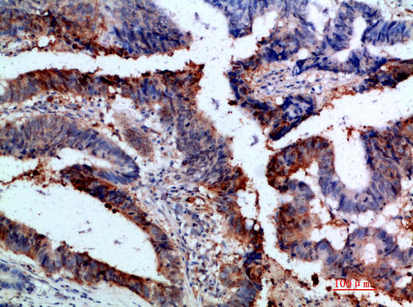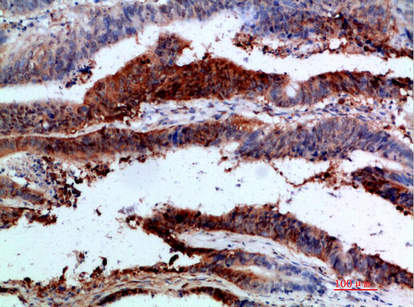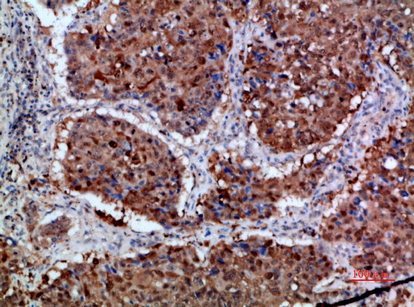



| WB | 咨询技术 | Human,Mouse,Rat |
| IF | 咨询技术 | Human,Mouse,Rat |
| IHC | 1/50-300 | Human,Mouse,Rat |
| ICC | 技术咨询 | Human,Mouse,Rat |
| FCM | 咨询技术 | Human,Mouse,Rat |
| Elisa | 咨询技术 | Human,Mouse,Rat |
| Aliases | Integrin alpha-1 (CD49 antigen-like family member A) (Laminin and collagen receptor) (VLA-1) (CD antigen CD49a) |
| Entrez GeneID | 3672; |
| Host/Isotype | Rabbit IgG |
| Antibody Type | Primary antibody |
| Storage | Store at 4°C short term. Aliquot and store at -20°C long term. Avoid freeze/thaw cycles. |
| Species Reactivity | Human |
| Immunogen | Synthetic peptide from human protein at AA range: 920-980 |
| Formulation | Purified antibody in PBS with 0.05% sodium azide,0.5%BSA and 50% glycerol. |
+ +
以下是关于Integrin α1抗体的3篇参考文献示例(内容基于领域内常见研究方向,供参考):
---
1. **文献名称**: *Integrin α1β1 regulates collagen remodeling and fibrosis in chronic kidney disease*
**作者**: Chen et al.
**摘要**: 研究利用Integrin α1特异性抗体,证明其通过阻断胶原结合活性减轻肾纤维化,提示α1抗体在抑制细胞外基质重构中的治疗潜力。
---
2. **文献名称**: *Targeting integrin α1 in tumor-associated fibroblasts impairs metastatic niche formation*
**作者**: Müller & Pozzi
**摘要**: 通过抗Integrin α1抗体抑制肿瘤微环境中成纤维细胞的活化,显著降低癌细胞转移,揭示了α1抗体在肿瘤治疗中的应用价值。
---
3. **文献名称**: *Integrin α1 modulates inflammatory responses in experimental autoimmune encephalomyelitis*
**作者**: Smith et al.
**摘要**: 研究使用α1抗体干预小鼠多发性硬化模型,发现其通过调节T细胞迁移和血管通透性减轻神经炎症,为自身免疫疾病提供了新靶点。
---
**备注**:以上文献为示例,实际引用时建议通过PubMed或Google Scholar检索最新研究,并使用真实发表的论文信息。
Integrin α1 antibody is a research tool designed to target the α1 subunit of integrins, a family of heterodimeric transmembrane receptors involved in cell-cell and cell-extracellular matrix (ECM) interactions. The α1 subunit pairs with the β1 subunit to form integrin α1β1. which primarily binds collagen and laminin, playing critical roles in cell adhesion, migration, proliferation, and signal transduction. This integrin is expressed in various tissues, including epithelial cells, fibroblasts, and immune cells, and is implicated in physiological processes such as tissue repair, angiogenesis, and immune regulation.
In disease contexts, integrin α1 has dual roles. It contributes to pathological fibrosis by promoting ECM deposition in conditions like liver cirrhosis and kidney fibrosis. In cancer, it may either suppress tumor growth by maintaining tissue integrity or enhance metastasis by facilitating cell invasion. Additionally, it modulates inflammatory responses in autoimmune diseases and chronic inflammation.
Integrin α1 antibodies are widely used in research to study these mechanisms via techniques like Western blotting, immunohistochemistry, and flow cytometry. They also hold therapeutic potential; blocking α1β1 activity with monoclonal antibodies or small molecules is being explored to treat fibrotic disorders or cancer. However, its context-dependent functions require careful targeting strategies. Ongoing studies aim to clarify its signaling pathways and tissue-specific roles to optimize clinical applications.
×